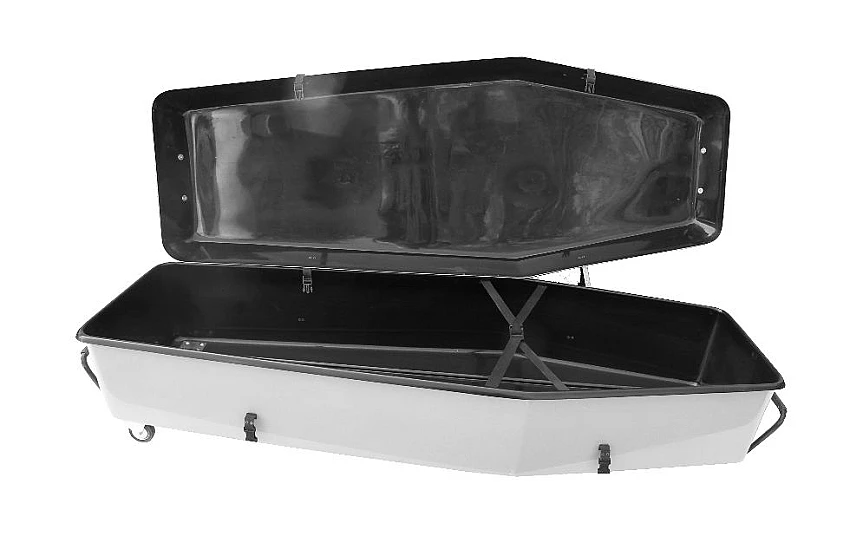Table of Contents
Safe transport of the deceased is one of the most important elements of work in the funeral industry. The proper selection of a transport capsule plays a key role in ensuring hygiene, protection, and proper respect for the deceased during transport. The available transport capsules differ in terms of materials, functions, and additional safeguards, making the choice of the right model a challenge. In our article "Choosing a Transport Capsule: Key Aspects of Safe Transportation," you'll find an overview of the most popular types of capsules, a discussion of their functions, and a guide on what to look for when making a purchase. With our tips, you will learn how to match a capsule to the specifics of transportation, ensuring safety and compliance with standards. Transporting the deceased is one of the most important aspects of working in the funeral industry. Whether the transport is for short distances within a city or long-distance, international transportation of the deceased, it is necessary to maintain the highest standards of safety, hygiene, and respect for the deceased. Transport capsules play a crucial role in this process, serving as specialized containers that provide the right conditions for transporting the body. Choosing the right model of capsule is crucial for ensuring safe transport. In this article, we will look at the different types of transport capsules, their functions, the materials they are made of, and the key aspects to consider when choosing them.
What is a Transport Capsule?
A transport capsule, also known as a transport coffin or body transport container, is a tightly sealed, reinforced device that allows for the safe transport of the deceased. The main task of the capsule is to ensure safety during transport, limit the risk of odors and bodily fluids leaking, and maintain hygiene throughout the logistics process.
These capsules are especially important for international transport, where the regulations regarding the transport of the deceased are stricter, and the capsules must meet specific sanitary and epidemiological standards.
Functions of a Transport Capsule
For a transport capsule to perform its job, it must have several key functions:
- Sealing: The capsule must be completely sealed to prevent leakage of bodily fluids and eliminate the risk of odors escaping.
- Damage Resistance: The capsule must be durable and resistant to mechanical damage during transport, especially when bodies are transported over long distances.
- Biological Isolation: The capsule should protect third parties from the risk of infection if the deceased suffered from contagious diseases. It must meet sanitary standards, especially for international transport.
- Lightweight: Despite their durability, transport capsules should be relatively lightweight to facilitate handling and transport.
- Aesthetic: While the main function of the capsule is its functionality, aesthetics are also important, especially in cases where the family of the deceased will be present during loading or transport.

Materials Used in the Production of Transport Capsules
Transport capsules can be made from various materials that affect their durability, weight, sealing, and resistance to external factors. Here are the most commonly used materials:
Metal
Advantages: Metal capsules, usually made of aluminum or stainless steel, are very durable and long-lasting. They provide excellent protection against mechanical damage and are easy to disinfect. They are also resistant to moisture.
Disadvantages: Their downside is weight – they are heavier than capsules made from other materials, which can make manual transport more difficult. They may also be more expensive.
Plastics (Polymers)
Advantages: Plastic capsules are lightweight, making transport and handling easier. They are also resistant to moisture and corrosion, and their price is generally lower than metal counterparts.
Disadvantages: They may be less resistant to mechanical damage compared to metal capsules. Additionally, they may not meet all the regulations for transporting the deceased in international transport.
Biodegradable Materials
Advantages: In response to the growing demand for ecological solutions, biodegradable materials such as wood, bamboo, or specially developed biopolymers are increasingly being used. These capsules are environmentally friendly and degrade quickly after burial.
Disadvantages: Biodegradable capsules may not meet the requirements for sealing and durability for long-distance transport, especially in air transport.
How to Choose the Right Transport Capsule?
Choosing the right transport capsule depends on several key factors. Here are the most important ones:
Purpose of Transport
- Domestic Transport: For short domestic routes, a capsule made of plastic or metal is usually sufficient. It must meet basic sealing requirements and be resistant to mechanical damage.
- International Transport: Regulations for international transport of the deceased are stricter, so sealed capsules that meet international standards, such as those set by the World Health Organization (WHO), are required. Metal capsules are preferred as they offer better biological isolation and sealing.
Weather and Environmental Conditions:
In extreme weather conditions (e.g., high temperatures or high humidity), the capsule must provide additional protection from external factors. In such cases, metal capsules or those made from plastics with enhanced durability are best.
Budget:
Plastic capsules are usually cheaper but may not offer the same level of protection as metal models. Metal capsules are more expensive but offer better durability and sealing, which is important for long-distance transport.
Ecological alternatives, such as biodegradable capsules, may be costly, but their choice is justified by growing environmental awareness.
Legal Regulations:
Every country has its own regulations regarding the transport of the deceased, so before choosing a capsule, ensure that the selected model meets local and international standards. Pay attention to regulations regarding sealing, materials, and sanitary requirements.
Personalization and Aesthetics:
Some families may prefer more aesthetically pleasing capsules, especially in cases of open-casket transport. In such cases, capsules with decorative elements or made from materials with a pleasant appearance, such as wood or bamboo, can be selected.

Modern Technological Solutions in Transport Capsules
The funeral industry, like other sectors, uses technological advancements to improve products. Here are some innovations gaining popularity in transport capsules:
- Capsules with Cooling Systems: Built-in cooling systems maintain the right temperature inside the capsule, which is crucial for long-distance transport, especially in warm climates.
- Capsules with Sensors: Modern models may be equipped with sensors that monitor internal conditions such as temperature and humidity, helping to control the state of the body during transport.
- High-tech Biodegradable Materials: More capsules are using innovative ecological materials that are not only biodegradable but also meet high durability and sealing standards.
FAQ - Frequently Asked Questions about Transport Capsules
1. What is a transport capsule and why is it necessary for transporting the deceased?
A transport capsule is a special container that ensures the safe transport of a deceased body. It is sealed, durable, and protects against leakage of bodily fluids and odors, which is especially important for long-distance transport, especially international.
2. What materials are most commonly used to produce transport capsules?
Transport capsules are most often made from metal (e.g., aluminum, stainless steel), plastics (polymers), or biodegradable materials (wood, bamboo). Each material has its advantages, such as durability, lightness, or eco-friendliness.
3. Are transport capsules required for international transport of the deceased?
Yes, in international transport, a transport capsule is usually required by the regulations of many countries. It must be sealed and meet sanitary standards to ensure biological safety during transport.
4. What are the key functions of a transport capsule?
The transport capsule should provide sealing, resistance to mechanical damage, biological isolation, and protection from external factors. Additionally, it should be easy to transport and allow for a respectful transport of the deceased.
5. Which transport capsules are best for long-distance transport?
For long-distance routes, especially international, metal capsules are best as they provide maximum sealing and durability. They are resistant to mechanical damage and ensure proper biological isolation.
6. Are there ecological alternatives to standard transport capsules?
Yes, biodegradable capsules made from materials like wood, bamboo, or biopolymers are becoming more popular. They are environmentally friendly, but their use depends on the requirements for sealing and durability in long-distance transport.
7. What should be considered when choosing a transport capsule?
When choosing a capsule, consider the purpose of transport (domestic or international), the material (durability and weight), sealing, compliance with sanitary regulations, and any preferences for aesthetics or ecology.
8. What legal regulations govern the transport of the deceased and the choice of transport capsule?
Each country has specific regulations regarding the transport of the deceased, which may require the use of sealed capsules. For international transport, compliance with sanitary norms and the regulations of the World Health Organization (WHO) and local authorities is necessary.
9. Can transport capsules be personalized?
Yes, some transport capsules can be personalized, especially in terms of aesthetics. For more advanced capsules, you can choose materials with a more elegant appearance, adding decorative elements. However, personalization has limitations due to functional requirements.
10. Are transport capsules reusable?
Most transport capsules are single-use, especially those used for international transport of the deceased. This is due to sanitary requirements and the need to maintain hygiene. However, some models, particularly metal capsules, can be reused if properly disinfected.








